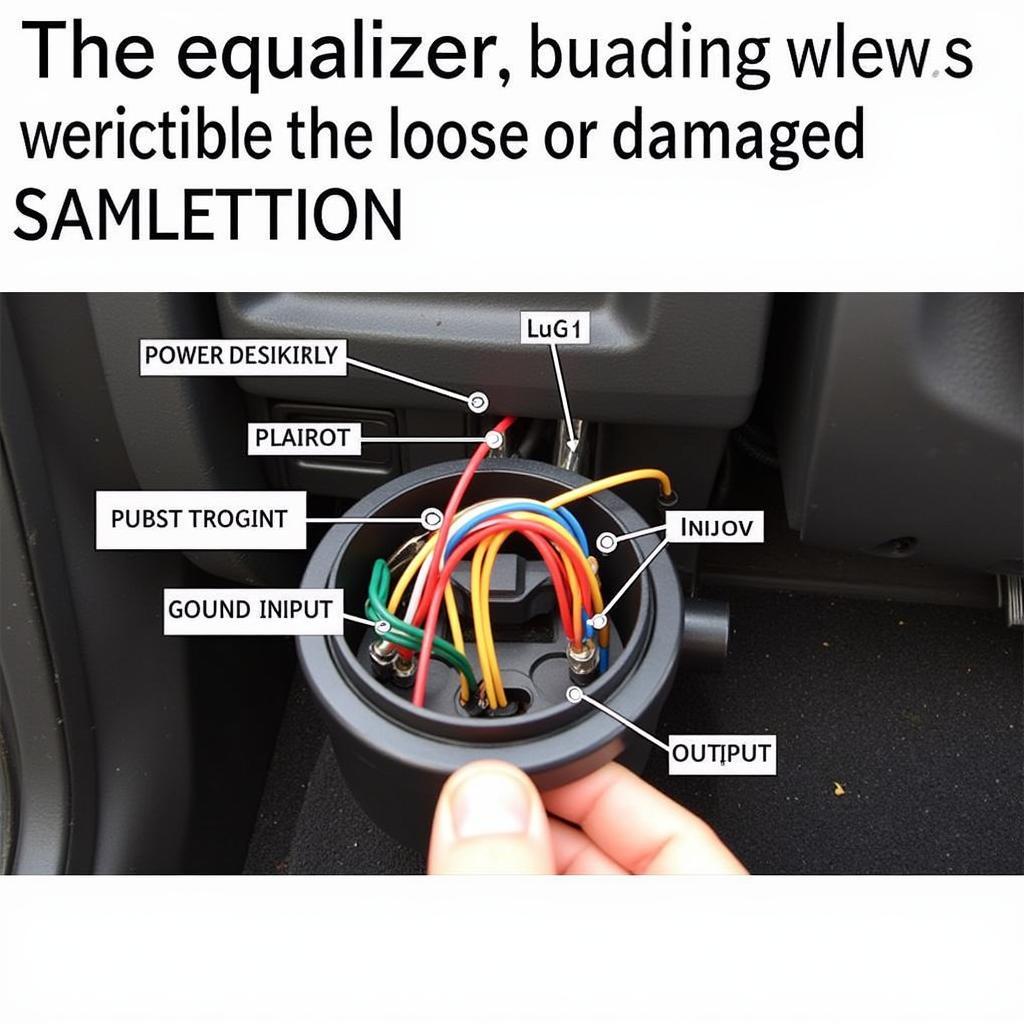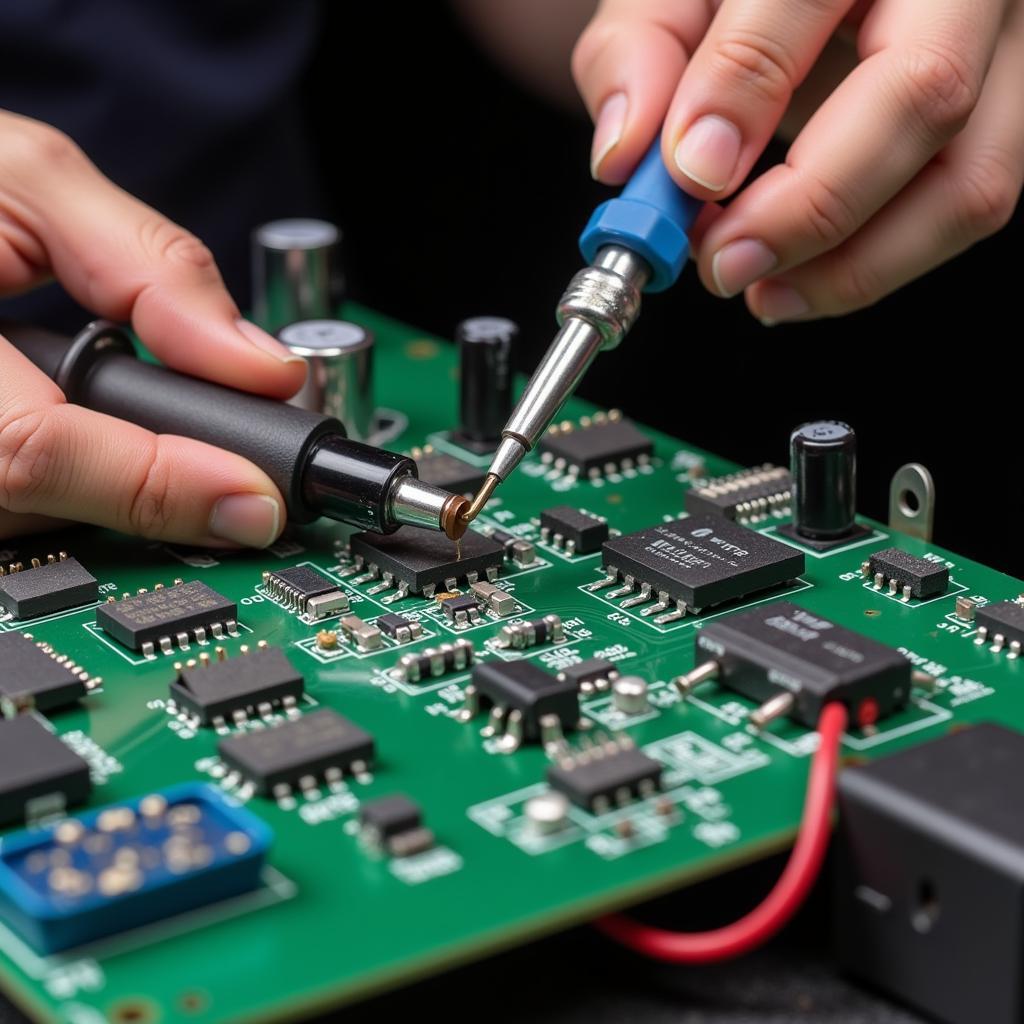Understanding how to repair a car equalizer can save you time and money. Whether you’re experiencing distorted sound, no sound at all, or intermittent issues, this guide will provide you with the knowledge and steps to troubleshoot and potentially fix your car’s equalizer. We’ll cover common problems, diagnostic techniques, and repair options, empowering you to take control of your car audio system.
Common Car Equalizer Problems
Several issues can plague a car equalizer, ranging from simple connectivity problems to more complex electronic failures. Identifying the root cause is the first step towards a successful repair. Some of the most frequent problems include:
- No Power: The equalizer might not be receiving power due to a blown fuse, faulty wiring, or a problem with the head unit’s power output.
- Distorted Sound: This can be caused by a damaged speaker, a faulty amplifier, incorrect equalizer settings, or a problem within the equalizer circuitry itself.
- No Sound: This could indicate a complete power failure, a broken connection between the equalizer and the audio system, or a malfunctioning equalizer component.
- Intermittent Issues: These are often the most challenging to diagnose and can be caused by loose connections, temperature fluctuations affecting components, or even a failing head unit.
- Inaccurate Display: If the equalizer’s display is showing incorrect information or not functioning at all, it could indicate a problem with the equalizer’s internal control board.
Diagnosing Car Equalizer Problems
Before attempting any repairs, it’s crucial to diagnose the problem accurately. Here’s a step-by-step guide:
- Check the Power: Use a multimeter to check the power supply to the equalizer. Ensure the fuse is intact and that power is reaching the unit.
- Inspect the Wiring: Carefully examine all the wiring connections between the equalizer, head unit, amplifier, and speakers. Look for any loose, damaged, or corroded wires.
- Test the Head Unit: Try playing audio through a different source, such as a phone or portable music player, to rule out a problem with the head unit itself.
- Isolate the Equalizer: Disconnect the equalizer from the audio system and test the remaining components to determine if the issue is isolated to the equalizer.
- Check the Ground Connection: A poor ground connection can cause a variety of audio problems, including distortion and no sound. Ensure the equalizer is properly grounded.
 Car Equalizer Wiring Inspection
Car Equalizer Wiring Inspection
How to Repair a Car Equalizer: Step-by-Step Guide
Once you’ve diagnosed the problem, you can begin the repair process. Here are some common repair procedures:
- Replace a Blown Fuse: If the fuse is blown, replace it with a fuse of the same amperage.
- Repair or Replace Wiring: Repair any damaged or corroded wires. If necessary, replace the entire wiring harness.
- Resolder Loose Connections: If you find any loose connections on the equalizer’s circuit board, carefully resolder them using a soldering iron and appropriate solder.
- Replace Components: If a specific component within the equalizer is faulty, such as a capacitor or resistor, replace it with a new one of the same specifications.
- Replace the Equalizer: If the equalizer is beyond repair, consider replacing it with a new one.
“A common mistake people make is attempting to repair complex electronic components without proper knowledge or tools,” says John Smith, Senior Automotive Electronics Technician at Car Audio Experts. “It’s often more cost-effective to consult a professional for complex repairs.”
 Car Equalizer Component Replacement
Car Equalizer Component Replacement
Conclusion
Repairing a car equalizer can be a rewarding experience, restoring your car audio system to its full potential. By following the diagnostic and repair steps outlined in this guide, you can often fix common problems yourself. However, if you’re unsure about any step or encounter complex issues, it’s always best to consult a qualified car audio technician. Remember, a properly functioning equalizer is essential for enjoying high-quality sound in your car.
FAQ
- What are the signs of a failing car equalizer?
- How can I test my car equalizer?
- Can I replace my car equalizer myself?
- What tools do I need to repair a car equalizer?
- Where can I find replacement parts for my car equalizer?
- How much does it cost to repair a car equalizer?
- How can I prevent future car equalizer problems?
“Regular maintenance and proper installation are crucial for preventing equalizer problems,” advises Maria Garcia, Lead Car Audio Installer at Sound Solutions Inc. “Make sure your wiring is secure and protected from moisture and extreme temperatures.”
Need further assistance? Contact us via WhatsApp: +1(641)206-8880, Email: [email protected]. Our customer support team is available 24/7.

Leave a Reply